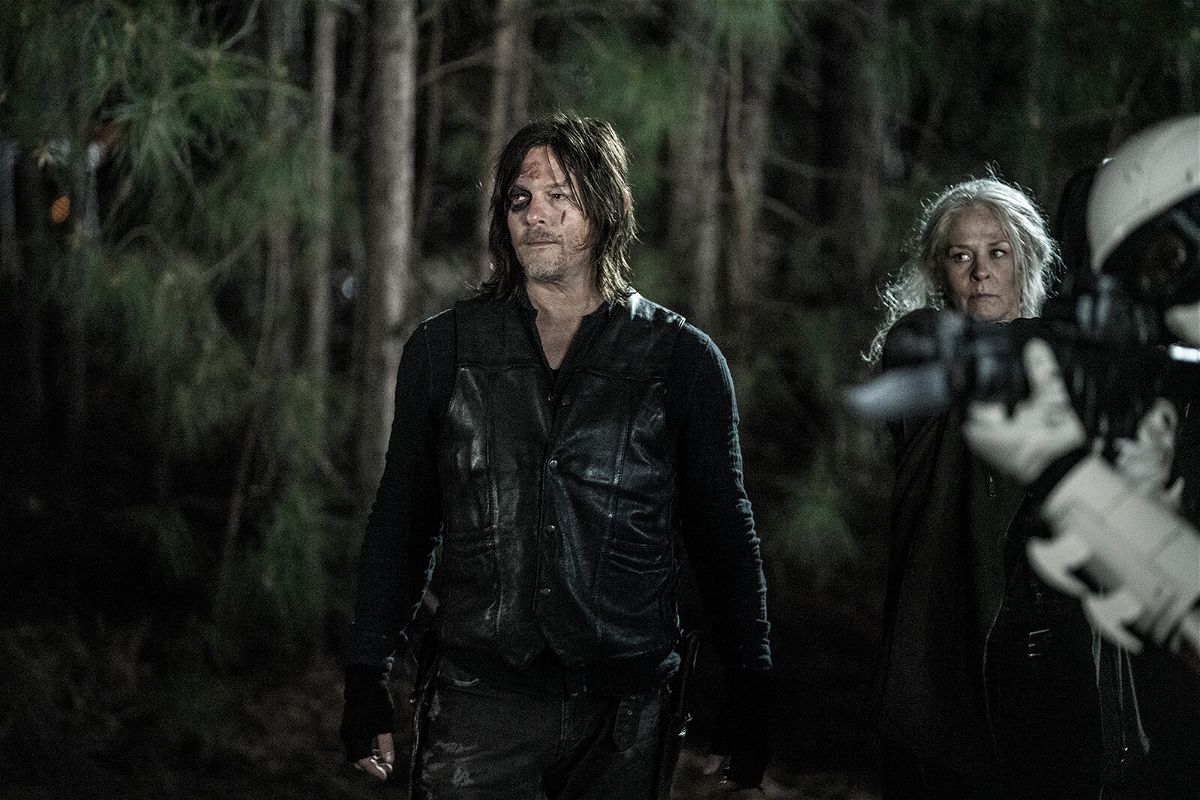‘The Walking Dead’ finally comes to an end, after biting off more than it could chew

Norman Reedus and Melissa McBride in the series finale of "The Walking Dead."
Review by Brian Lowry, CNN
Forgive AMC, at least a little bit, for almost drunkenly celebrating “The Walking Dead” in its heyday by feeding audiences as much content related to the zombie drama as they possibly could. Yet as the series comes to an end, finally, after 11 long seasons, it seems obvious that the network and the producers greedily bit off more than they could chew.
The final season pursued an overarching plot, as the hardy band of core characters sought to escape the forces of the community known as the Commonwealth. At the same time, they appeared to be operating with a hand tied behind their backs, given the already-announced spinoffs that had to be planted, nurtured and promoted.
Watching the finale, it was acutely obvious that “The End” of the flagship show isn’t really intended to be the end of anything; rather, the 90-minute finish was punctuated by promos for the spinoff series that are coming — “Dead City,” “Rick & Michonne” and “Daryl Dixon” — taking that much more suspense away from what transpired.
What did that leave in terms of the episode, subtitled “Rest in Peace?” A cathartic comeuppance for Pamela Milton (Laila Robins), the Commonwealth’s amoral leader, with Mercer (Michael James Shaw) helping depose her. Some sobering losses, offering a reminder there is seldom gain in this dystopian world without sacrifice. And a one-year leap into the future, offering hope of greater normalcy, with Ezekiel (Khary Payton) and Mercer having taken over.
It was the smaller moments, actually, that stood out. A chaotic sequence in the hospital. Rosita (Christian Serratos) briefly turning into a superhero. A nice exchange between Negan (Jeffrey Dean Morgan) and Maggie (Lauren Cohan), with a heartfelt apology for what he had taken from her. Daryl (Norman Reedus) bidding farewell to Carol (Melissa McBride) before riding away on his own mission to star in another show.
In its early seasons, “The Walking Dead” excelled in part because of its unpredictability, as the montage of characters who had died reminded the audience. Impressively, the series kept reloading with new players as well as new threats.
Yet the departure of Rick Grimes, played by Andrew Lincoln, in 2018 turned out in hindsight to be a pivotal moment, not only dealing the show a creative blow but indicating the sleight of hand involved in trying to maximize it as a corporate commodity.
You see, Rick didn’t die, but rather left, with the promise that he would return in a series of movies. Those plans later morphed into a limited series, but the sense that “The Walking Dead” was no longer the priority in AMC’s “Dead” universe had been pretty well cemented.
AMC also became overly enamored with extending the brand, introducing “Fear the Walking Dead,” following by “The Walking Dead: World Beyond” — essentially a teen-centric version of the show — and more recently the anthology series “Tales of the Walking Dead.”
During that period, audience consumption patterns have changed, even if zombie appetites haven’t. With people drifting away from linear TV viewing and watching more via streaming services, the communal aspects of viewing the show each week and seeing who would live or die diminished, a trend further fueled by AMC’s decision to make episodes available early to streaming subscribers on AMC+.
Having announced plans to wrap up the flagship show more than two years ago using three eight-episode arcs, these moves might have made sense as business decisions, but they’re harder to justify as creative choices.
Executive producer Angela Kang told Entertainment Weekly that the series, like the comics, couldn’t end in a definitive way, calling it “the zombie story that never ends.” On “Talking Dead,” the talk show devoted to the series, Kang said, “We tried to give everybody a moment in the sun.”
Yet even with those limits, it’s hard to get excited about a “finale” with so little closure. Television is always hungry for another hit, and at its height “The Walking Dead” was the TV equivalent of a supernova. But AMC turned the franchise into a different kind of zombie, marching onward even when the life had been largely sapped out of it.
The-CNN-Wire
™ & © 2022 Cable News Network, Inc., a Warner Bros. Discovery Company. All rights reserved.

